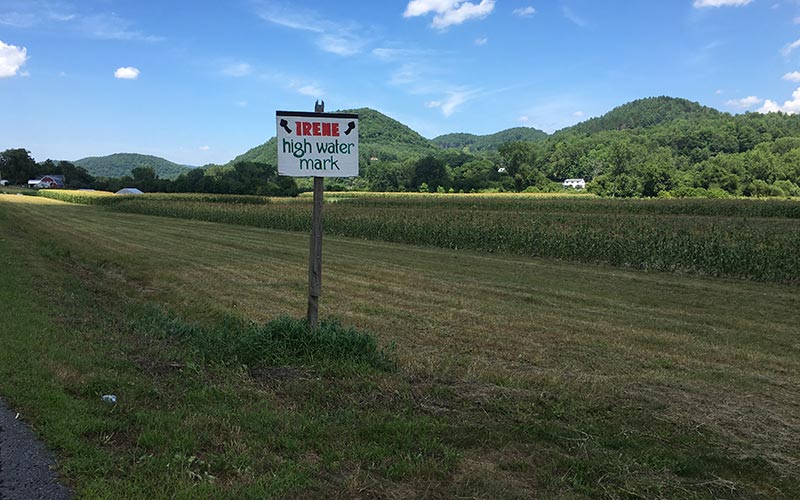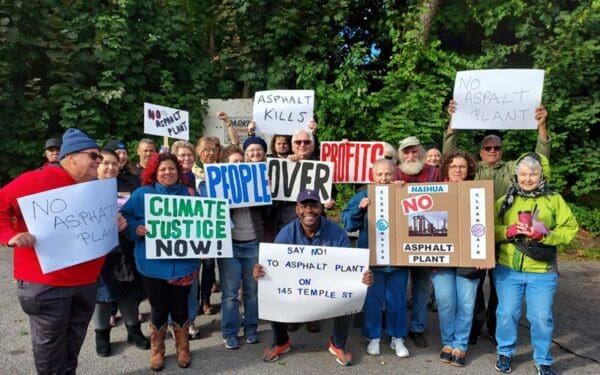
Climate change is fueling extreme weather in Vermont, like Tropical Storm Irene and the July 2023 flooding, and ordinary Vermonters are paying the price.
You can’t see the White River in this photo, but the sign shows where this roaring river reached its high point during Tropical Storm Irene. The river completely inundated this farm field, submerging all its melons, sweet potatoes, pumpkins, and sweet corn. A local newspaper captured the farmer’s account of the 2011 flood: “[The water] was literally coming up an inch a minute,” he said.
All told, the USDA’s Farm Service Agency in Vermont’s unofficial estimate for farmers’ economic losses approached $20 million. These catastrophes are occurring increasingly frequently. A recent report by Rebuild by Design found that Vermont suffered through 17 climate disaster events between 2011 and 2021 – the seventh most of any state in the country. A 2021 report by University of Vermont scientists forecast that flooding caused by more extreme weather will cost $5.2 billion in property damage in the decades ahead. The costs for the July 2023 floods in Vermont have already topped half a billion dollars; many of those costs will not be reimbursed by federal disaster relief available through FEMA.
“If you make a mess, you clean it up.” It’s a message that most of us learn in kindergarten. Unfortunately, it’s a lesson that Big Oil doesn’t seem to have ever learned. Scientists are clear that the burning of fossil fuels is causing, and in many cases, intensifying these disasters. What’s more, the field of “climate source attribution science” allows us to trace the cause of these damaging events back to individual companies’ fossil fuel emissions. Despite these scientific developments around what and who is causing the problem, it’s people like you and me rather than Big Oil who are footing the bill. It’s simply not fair. That’s why we’re fighting to advance legislation in Vermont to create a “Climate Superfund.”
What’s a Climate Superfund?
There’s precedent for expecting polluters to pay to clean up after themselves. When toxic pollution fouls soil and water, it puts nearby communities at risk. As a response, the government created a federal “Superfund,” a pool of money used to clean up toxic sites. The program holds the polluters responsible for funding the restoration process.
The Vermont House and Senate are considering Climate Superfund bills (S.259 and H.809) that would create a parallel program for climate change damages. Like hazardous waste polluters under the Superfund program, Big Oil companies like ExxonMobil and Shell would pay their fair share of the costs Vermonters have paid and will pay in the future to adapt to and recover from the climate disruption caused by fossil fuel companies and their products.
The bills task the State Treasurer with leading a multi-agency effort to estimate these costs. The state will then use this estimate to determine how much large fossil fuel companies will have to pay.
Why should we create a Climate Superfund?
Ultimately, it’s Big Oil corporations that are the most significant drivers of climate change. Simple fairness says that these companies should (literally!) pay their fair share of the price for recovering from climate-related disasters and preparing our communities for more extreme weather caused by fossil fuel companies and their products. If this bill passes, Big Oil will stop getting a free pass to destroy the climate, profit immensely, and face zero cost-recovery obligations.
Climate change is coming with a lot of steep expenses, and they aren’t being distributed fairly. The most vulnerable communities face the biggest costs associated with increasing extreme weather, rising temperatures, and other climate change impacts. Meanwhile, Big Oil companies are taking advantage of tax breaks and subsidies, which come from taxpayer’s pockets, to fund their work of polluting the atmosphere.
Why do we need this in Vermont?
As a state, Vermont already spends the fifth highest amount per person on climate-related disasters. And lawmakers are hearing from their constituents that they’ve had enough with footing these bills on their own.
That’s why the Climate Superfund bills have such broad support. They were introduced with 20 of 30 senators and 87 of 150 representatives as co-sponsors. The bills have co-sponsors who represent every county in Vermont.
Should Vermonters keep having to cover climate-related costs out of pocket? Or should we ensure that the entities responsible pay their fair share? Here’s a stat that might help you make up your mind: Big Oil generated more than $200 billion in profits just last year. They’ve got room in their budget to help Vermont address the mess they’ve created.
If you agree, you’re in the majority. In one survey, almost two-thirds of Vermonters supported the Climate Superfund proposal. People recognize that this plan is a common-sense, pragmatic approach to funding our climate preparedness needs. Other states are already making headway on similar bills. Please contact Governor Scott and your legislative representatives to let them know that you support making Big Oil pay. Vermont is facing an expensive tipping point in our recovery from and preparedness for the impacts of climate change. It’s time for Big Oil to pay their fair share!




